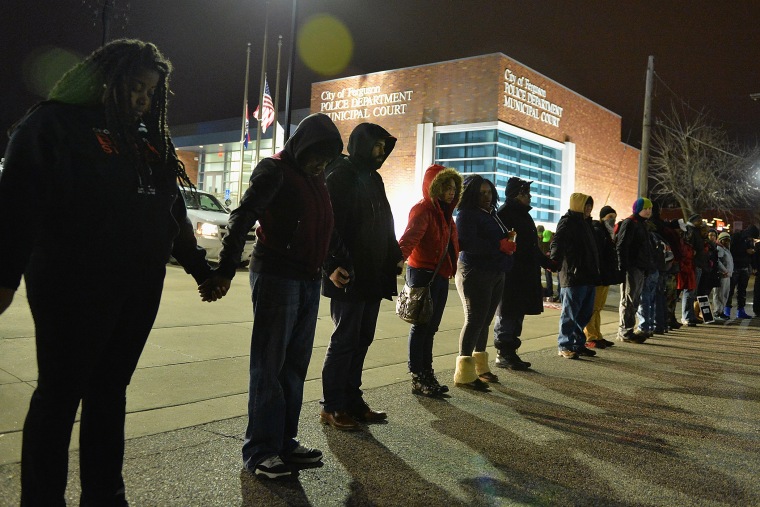“It’s only three days.”
That’s what a court staffer in Ferguson, Missouri told the Department of Justice when asked why they don’t track the time a person spends behind bars before their case is heard by a judge.
In Ferguson, if you are arrested and too poor to post bond, they can hold you for three days before you even get to see a judge. And if the judge releases you after those three days, and you are later found guilty of that small offense for which you were arrested, you don’t get credit for those three days toward your sentence.
Even if your sentence was just two days, you would have to go back to jail for a total of five days. But if you can afford to pay the bond, even if you pose a risk to public safety, then you would be released -- no matter your criminal history or likelihood to commit a crime while awaiting trial.
RELATED: Ferguson judge resigns, state supreme court to take all municipal cases
The DOJ’s report on Ferguson found that the authorities don’t bother to track whether you’ve served time when it comes to calculating sentences. This cavalier attitude about three days in the life of a person underscores what’s missing in our paradigm about how we use jails. It’s only three days -- what’s the big deal?
"What would happen if you were gone from your life, unexpectedly, for three days?"'
What would happen if you were gone from your life, unexpectedly, for three days? For most of the people arrested in America, three days could mean a disruption in income, maybe the loss of a job, missing doses of medication or other health care needs, or the inability to make the rent payment, and probably more than a few missed birthdays or other special family events.
More than what someone misses or loses during those three days, there is a toll paid by our communities and victims. Three days in jail makes a low-risk person more likely to come out at higher risk to commit a crime in the near future. This impact isn’t true for higher-risk people—they go in high-risk and come out likely the same, unless we do something to help them. But the vast majority of those in jail in America, including Ferguson, are low-risk. So these three days are not “no big deal.” In fact, they turn out to matter the most.
Let’s not forget that this dysfunctional system isn’t hurting everyone equally: African Americans make up 93% of all arrests in Ferguson and 95% of those spending two days in jail or more.
Nationwide, people of color are bearing the brunt of a discriminatory bail system that leaves those who can’t afford bond behind bars for anywhere from days to years before they get their day in court.
African Americans are two times more likely to be detained than whites for non-violent drug arrests in America, and their pretrial bond is 35% higher than for white men charged with the same offense.
But the issue of how people are being treated pretrial doesn’t stop with this “three day” problem, or the fact that they don’t get credit for serving those days: In Ferguson, the financial bond system itself is carelessly applied.
RELATED: Holder outlines damning report of racial bias by Ferguson police
The DOJ report notes: “a haphazard bond system that results in people being erroneously arrested, and some people paying bond but not getting credit for having done so. Documents describe officers finding hundred dollar bills in their pockets that were given to them for bond payment and not remembering which jail detainee provided them.”
It sounds like a bad TV show: Ferguson police were literally taking bond money themselves, shoving it in a pocket like a middle school allowance, and not recording who it came from or where it goes. A person could pay a $100 bond, end up back in jail anyway, and the money they spent is simply gone.
"People with money, even if they are dangerous, can purchase their freedom while poorer defendants remain in jail."'
Unfortunately, the Ferguson system is not unique. The majority of people in jail today have not been convicted of a crime -- they are there because our bail system relies on money, not risk. People with money, even if they are dangerous, can purchase their freedom while poorer defendants remain in jail.
The report’s recommendations for the bond system focus on a better process to collect, count and apply bond money. It’s the wrong solution. Doing bonds better in Ferguson will still imprison poor people for being poor, and will allow dangerous people with income to be released.
Better record-keeping will still result in poor people -- most of whom will never be convicted -- being jailed pretrial and potentially losing their homes or having less to feed their kids. This is how you break up communities, and how you erode any sense of trust between the system and the people it serves.
We hear a lot today about the long term impacts of over-incarceration, but we cannot forget the fact that some of our policies are hurting people now. We won’t see justice in America until we rebuild community trust through safe, fair and effective pretrial justice, in Ferguson and nationwide.
Cherise Fanno Burdeen is the Executive Director of Pretrial Justice Institute, a national thought leader working to advance safe, fair, and effective pretrial justice that honors and protects all people.
